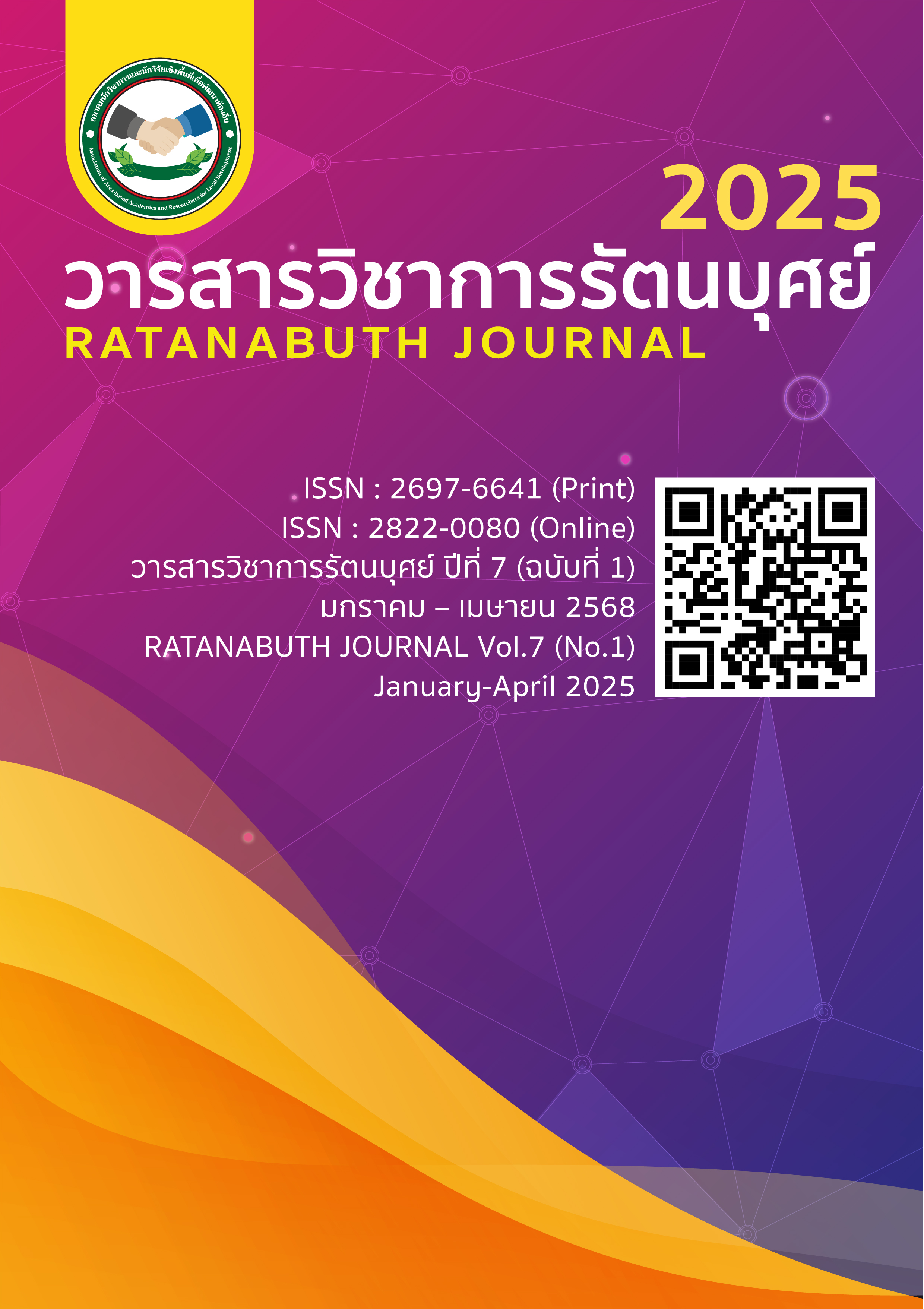Guidelines for Promoting the New Normal Professional Learning Communities in School Guidelines for Promoting the New Normal Professional Learning Communities in School
Main Article Content
Abstract
This academic article aims to explore the guidelines for promoting professional learning communities (PLCs) in the context of the new normal within educational institutions. The findings reveal that the COVID-19 pandemic marked a significant turning point that accelerated the shift toward a new way of life and educational practices. Teachers were compelled to adjust their teaching and learning approaches to ensure educational continuity and effectiveness. In response, school administrators and educators must collaborate systematically as a network, emphasizing participation, shared learning, and continuous professional development. The integration of professional learning communities, supported by digital technology and modern communication platforms, serves as a vital mechanism for enhancing educational quality. This collaborative process enables knowledge sharing, peer reflection, and the cultivation of a sustainable learning organization, marking the beginning of a resilient and adaptive new-normal professional learning community within schools.
Article Details

This work is licensed under a Creative Commons Attribution-NonCommercial-NoDerivatives 4.0 International License.
References
กัมพล ไชยนันท์. (2554). ยุทธศาสตร์การสร้างชุมชนแห่งการเรียนรู้ โดยใช้โรงเรียนเป็นฐานในภาคเหนือตอนบน.วิทยานิพนธ์ปริญญาปรัชญาดุษฎีบัณฑิต สาขาวิชาการบริหารการศึกษา. บัณฑิตวิทยาลัย: มหาวิทยาลัยเชียงราย.
ชัชวาลย์ อาราษฎร์. (2560). การพัฒนาชุมชนวิชาการในโรงเรียนการศึกษาภาคบังคับด้วยกระบวนการการวิจัยปฏิบัติการแบบมีส่วนร่วม. วิทยานิพนธ์ปริญญาศึกษาศาสตรมหาบัณฑิต สาขาวิชาการบริหารการศึกษา. บัณฑิตวิทยาลัย: มหาวิทยาลัยขอนแก่น.
ชัยยนต์ เพาพาน. (2559). ผู้บริหารโรงเรียนยุคใหม่ในศตวรรษที่ 21. วารสารคณะครุศาสตร์ มหาวิทยาลัยกาฬสินธุ์, 1(1), 304-306.
ณัฐยา บุญภักดี & เบญจมาภรณ์ ลิมปิษเฐียร. (2563). ศูนย์สุขภาวะ: เธอยังโอเคอยู่มั้ย ปรับตัวอย่างไรให้มีความสุขในช่วงโควิด-19. สืบค้นเมื่อ 20 กุมภาพันธ์ 2565, จาก https://www.mgronline.com/qol/detail/9640000074821.
ณัฐวุฒิ อินทุภูติ. (2564). การจัดการศึกษาในยุควิถีใหม่. กรุงเทพฯ: สำนักพิมพ์วิชาการ.
บุญชม ศรีสะอาด. (2565). เทคโนโลยีกับการจัดการศึกษาในศตวรรษที่ 21. กรุงเทพฯ: มหาวิทยาลัยธรรมศาสตร์.
เทื้อน ทองแก้ว. (2563). การออกแบบการศึกษาในชีวิตวิถีใหม่ (Design-Based New Normal): ผลกระทบจากการแพร่ระบาด COVID-19. Journal of Teacher Professional Development, 1(2), 1-10.
ประภาภัทร นิยม. (2564). ชุมชนการเรียนรู้ “ครูเพื่อศิษย์” PLC-Coaching ครูและศิษย์ต้องไม่ตกหลุมการเรียนรู้แบบผิวเผิน. สืบค้นเมื่อ 20 พฤษภาคม 2565, จาก https://www.ryt9.com/s/prg/3186510.
ปองทิพย์ เทพอารีย์. (2557). การพัฒนารูปแบบชุมชนแห่งการเรียนรู้เชิงวิชาชีพสำหรับครูประถมศึกษา.ปริญญานิพนธ์การศึกษาดุษฎีบัณฑิต สาขาวิจัยและพัฒนาหลักสูตร. บัณฑิตวิทยาลัย: มหาวิทยาลัยศรีนครินทรวิโรฒ.
พพันธ์ เดชะคุปต์ & พเยาว์ ยินดีสุข. (2560). ทักษะ 7C ของครู 4.0. กรุงเทพมหานคร: จุฬาลงกรณ์มหาวิทยาลัย.
วิจารณ์ พานิช. (2555). องค์แห่งการเรียนรู้และการจัดการความรู้ (พิมพ์ครั้งที่ 2). กรุงเทพมหานคร: ตถาตาพับบลิเคชัน.
วิชัย วงศ์ใหญ่ & มารุต พัฒผล. (2557). การโค้ชเพื่อการรู้คิด. กรุงเทพมหานคร: จรัลสนิทวงศ์.
ศิริวิไล มาตรเลิง & ศันสนีย์ จะสุวรรณ์. (2564). การขับเคลื่อนชุมชนแห่งการเรียนรู้ทางวิชาชีพในชีวิตวิถีใหม่. การประชุมวิชาการนำเสนอผลงานวิจัยระดับชาติและนานาชาติครั้งที่ 14 “Global Goals, Local Actions: Looking Back and Moving Forward 2021”, 18 สิงหาคม 2564.
สิริพันธุ์ สุวรรณมรรคา. (2556). Teachers as learner: การสร้างชุมชนแห่งการเรียนรู้ทางวิชาชีพครู โดยใช้กระบวนการชี้แนะและการเป็นพี่เลี้ยง (วิดิทัศน์). กรุงเทพมหานคร: ปิโก (ไทยแลนด์) ร่วมกับคณะครุศาสตร์ จุฬาลงกรณ์มหาวิทยาลัย.
สุชาติ ทวีพรปฐมกุล. (2563). ภาวะผู้นำการศึกษาในยุคดิจิทัล. นครราชสีมา: สำนักพิมพ์ครุศาสตร์.
สุภัทรา สภาพอัตถ์. (2562). การบริหารจัดการชุมชนแห่งการเรียนรู้ทางวิชาชีพในโรงเรียนมัธยมศึกษา.ดุษฎีนิพนธ์ปริญญาปรัชญาดุษฎีบัณฑิต สาขาวิชาวิชาการบริหารการศึกษา. บัณฑิตวิทยาลัย: มหาวิทยาลัยศิลปากร.
สุรพล อิสรไกรศีล. (2563). ราชบัณฑิต บัญญัติศัพท์ “New Normal” ความปกติใหม่. ฐานวิถีชีวิตใหม่. สืบค้นเมื่อ 19 เมษายน 2565, จาก https://www.facebook.com/surapol.issaragrisil/posts/10207392559168907.
สำนักงานคณะกรรมการการศึกษาขั้นพื้นฐาน. (2564). แนวทางการดำเนินงานชุมชนแห่งการเรียนรู้ทางวิชาชีพ (Professional Learning Community: PLC) วิถีใหม่. กรุงเทพฯ: สำนักงานคณะกรรมการการศึกษาขั้นพื้นฐาน.
สำนักงานคณะกรรมการการศึกษาขั้นพื้นฐาน. (2563). ระบบสารสนเทศเพื่อการบริหารการศึกษา กลุ่มสารสนเทศ สำนักนโยบายและแผนการศึกษาขั้นพื้นฐาน. สืบค้นเมื่อ 20 กุมภาพันธ์ 2565, จาก https://www.data.bopp-obec.info/emis/.
สำนักงานเลขาธิการสภาการศึกษา. (2563). แนวทางการจัดการศึกษาในสถานการณ์การแพร่ระบาดของโรคติดเชื้อไวรัสโคโรนา 2019 (COVID-19). กรุงเทพฯ: กระทรวงศึกษาธิการ.
Anderson, T., & Rivera-Vargas, P. (2020). A critical look at educational technology from a distance education perspective. Digital Education Review, 37, 208–225.
Crowther, F.K. (2001). Developing teacher leaders: How teacher leadership enhances school success. Thousand Oaks, CA: Corwin Press.
DuFour, R. (2010). Professional Learning Communities: A Bandwagon, an Idea Worth Considering, or Our Best Hope for High Levels of Learning?. Middle School Journal, 39(1), 4-8.
DuFour, R. (2004). What is a “professional learning community?”. Educational Leadership, 61(8), 6–11.
Fullan, M. (2007). The new meaning of educational change (4th ed.). New York: Teachers College Press.
Hord, S. M. (2004). Professional learning communities: An overview. Southwest Educational Development Laboratory.
Stoll, L., Bolam, R., McMahon, A., Wallace, M., & Thomas, S. (2006). Professional learning communities: A review of the literature. Journal of Educational Change, 7(4), 221–258.
Harris, A., & Jones, M. (2020). COVID 19 – school leadership in disruptive times. School Leadership & Management, 40(4), 243–247.
Hord, S. M. (2009). Professional Learning Communities: Educators Work Together Toward a Shared Purpose-Improved Student Learning. National Staff Development Council.
Leclerc, M., Moreau, A. C., Dumouchel, C., & Sallafranque-St-Louis, F. (2012). Factors that Promote Progress in Schools Functioning as Professional Learning Communities. International Journal of Education Policy and Leadership, 7(7), 1–14.
OECD. (2020). The impact of COVID-19 on education: Insights from education at a glance 2020. Retrieved February 20, 2022, from https://www.oecd.org/education/the-impact-of-covid-19-on-education-insights-education-at-a-glance-2020.pdf.
UNESCO. (2021). Education in a post-COVID world: Nine ideas for public action. Retrieved February 20, 2022, from https://unesdoc.unesco.org/ark:/48223/pf0000375706.


